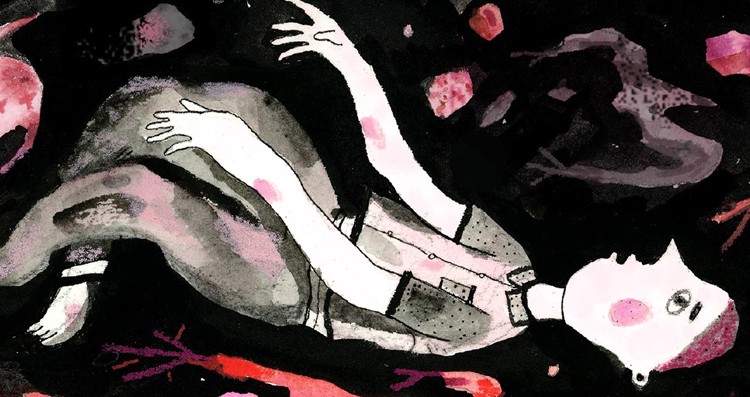Books & Culture
The Star of the Show
Mike Scalise’s The Brand New Catastrophe is an important book about being truthful to oneself and about how we handle illness

“Telling a good catastrophe anecdote,” says Mike Scalise, “means becoming a maestro of sympathy.” Not only does Scalise mine his brain tumor story for sympathy points, he breaks it down with hilarious aplomb in his memoir, The Brand New Catastrophe. Scalise’s book covers the months just after he finds out he has acromegaly, a rare condition caused by a tumor on his pituitary gland. The treatment leaves him hormone-less, and struggling to find the energy for tasks that most people do with ease. In life, Scalise bends the tumor story to alter or create his sense of self as he sees fit. What ends up happening is that he discovers he has a talent for narrative. Scalise’s book, then, is his effort to pick apart — dissect, to use a relevant metaphor — why his disaster and illness stories work and how he has successfully crafted them. Sound a little macabre? Scalise realizes that, but he’s all in with gallows humor. He artfully balances coruscating wit with gritty realism about his disease.
In early chapters, Scalise recounts his first experience with the disaster story, a high school swim team mishap, a near-drowning that became legendary in his town. Scalise realizes something in the telling of the story:
[T]he story became the star of the show, while the person at its core — the one with the tiny puddles of water in his once pristine-lungs, the twelve-year competitive swimmer who’d go swimming again only a handful of times over the next decade — disappeared.
He learns to harness this power. This first taste of the power of storytelling changes young Scalise, and though he won’t become a writer for many years, his life begins to shape around the idea of story itself. For Scalise, this very specifically means the way in which he can manipulate people with his stories, often into feeling bad for him. But he establishes early that he wants to be known as the joking guy who doesn’t take his death too seriously. The swimming disaster allows him both to characterize himself this way and to begin to find his voice. His memoir opens on his illness but immediately flashes back to the drowning and it’s a wise choice. Scalise brings the reader into his world before the illness, and we see the ways in which story defined him before his illness dictated the plot.
As Scalise’s illness progresses, he begins to study himself like a character in a narrative. Outwardly, he’s making jokes about the hole in his head, but inwardly he’s troubled by what he perceives as a lack of meaning or purpose. “For all the bravado I showed in public,” he says, “the shit jokes, the wit of character — and it truly felt like that, a role I inhabited — in my private moments I couldn’t lock on to a single thread of insight or introspection about anything.” Scalise’s control of the story is sure; he writes about how he studies himself as the events are happening, but the long view that memoir affords him also adds another layer to his analysis of self. What emerges is a man increasingly more competitive with his mother, who is also struggling with lifelong illnesses, and angry that he cannot find a role model to show him the way his disease will progress. He is at the mercy of his body, and though he handles his frustration with humor, his reflections on the sick human condition are what illuminate the most about the lack of control in every human life.
“This is a story about being truthful, a story about how we handle illness, and a story about what kinds of narratives we’re used to reading about and around disease.”
Scalise’s memoir comprises a set of rules for how to be sick and tell a good story about it; from the start, he uses a flippant tone designed to make the reader think that these rules are just created to amuse himself or to make sense out of his own experience. But the power of Scalise’s memoir lies in the comparisons he makes between his own illness dissected and studied on a molecular level from the inside, and his mother’s, which he studies from afar. “I was angry because she refused to be sick better,” he says, and as bits of his darkest feelings begin to seep out, his memoir takes on an unexpected and profound resonance about family. Scalise purports to write about control of oneself. “The rules I’d made for myself in crafting a disaster story were designed,” he says:
at least in part, to exert the illusion of control over my illness, which swirled below my skin in ways I could never truly harness. Owning parts of my illness, steering what people knew and how they saw me in relation to it, was all I could do to assume authority over it. I was good at that part.
But it is Scalise’s realizations about family and the secrets we can never understand about our loved ones that leave a lasting impression. His analysis of his own illness, then, taken in light of how little he understands his mother’s, takes on a different tone.
This is the most entertaining book about a brain tumor you’ll read for a while. Scalise wants it that way. But don’t mistake the lighthearted tone for a lack of seriousness or insensitive handling of the material. Scalise cuts away all of his own pretenses and forces himself to examine all of the things he wants to hide. This is a story about being truthful, a story about how we handle illness, and a story about what kinds of narratives we’re used to reading about and around disease. Scalise shows himself to be a capable writer in what is a thoughtfully conceived and skillfully executed debut.









